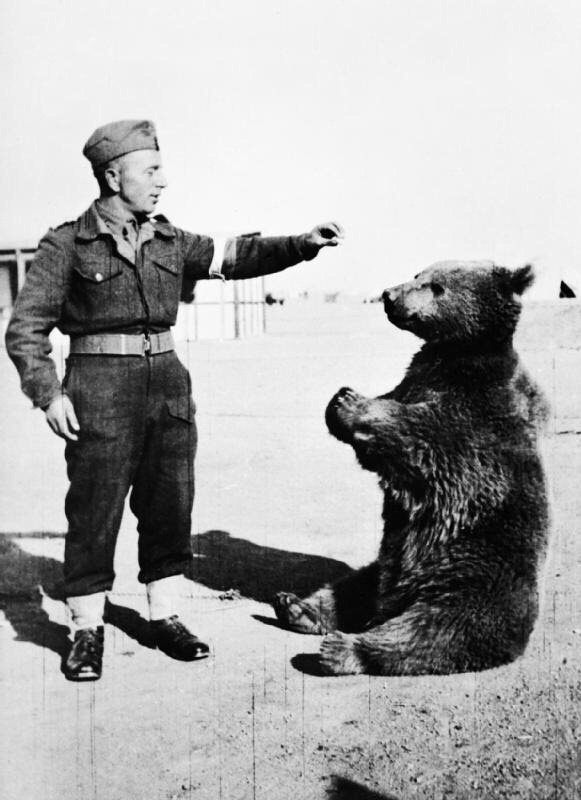Wojtek: The unusual polish soldier that drank beer and went to war.
4 min read
When at the port of Naples the british official Archibald Brown, looking at the roster in his hand, called out the name—“Corporal Wojtek”, nobody came forward. It was mid-February 1944, and the official was at Naples to help process a unit of Polish soldiers that had just arrived by ship from Alexandria in Egypt, to join forces with the Allies in their fight against Germans and Italians. One of his tasks was to check crew manifests and speak with new arrived soldiers. The official Brown consulted once again the document. It was sure, that there was a soldier named Wojtek! He could see the soldier’s service number, his pay book…but where was the man? An amused colonel came forward with a cage, with inside a full-grown Syrian brown bear. This, the colonel explained, was Corporal Wojtek!

Wojtek’s unusual military career began in the spring of 1942 in a Polish Army camp in northern Persia, today’s Iran, where a group of Polish soldiers came across a young shepherd boy who had found an alive bear cub. In exchange for a few food, some chocolate, a Swiss knife and other small things, the boy leaved his cub, and the soldiers named their new adopted pet Wojtek, a common Polish name, but just by coincidence, Wojtek means “happy warrior”. The soldiers treated Wojtek like a baby, feeding him with condensed milk in a vodka bottle, and later with fruits, marmalade, and honey. Wojtek grew fast and before long took to drinking beer, which became his favorite drink. Wojtek also ate cigarettes (ate, not smoke!) although some stories say he did both. Many of the men in this camp were former prisoners of war who were released in the Soviet Union, where they had been imprisoned after their capture during the Nazi-Soviet invasion of Poland in 1939. In fact, following Germany’s attack on the Soviet Union in 1941, many of the prisoneers who had survived the Gulags were released and sent to camps in Persia and the Middle East where they were retrained for the war effort. After suffering so much in the Soviet internment camps, the men were sent back to war and their country itself was occupied. Many had lost their homes, friends and family, and for them, only source of joy was the cute bear pup.
Soldiers wrestled with him, play boxing and take him on rides on the back of pickup trucks, and wherever the regiment went, Wojtek went with their, through Persia, Iraq, Syria, Palestine and Egypt.

And of course, Wojtek was no longer a cub. He stood close to 2 meters tall and weighed close to 226kg. It had become increasingly difficult for the men to pass him off as a pet, especially when explaining to port officials and in fact, in April 1944, Wojtek got stuck at the port of Alexandria because officials refused him on board the ship, saying that he was an animal and only soldiers could make the travel. And so, what to do? Soldiers enlisted Wojtek as a regular soldier, gave him a rank, a service number, and a pay book. All regular, and Wotjek was allowed on board. Officially a soldier, Wojtek was trained by his teammates to carry crates full of heavy mortar rounds, even if he was lazy and always looking for empty boxes to carry.

His best moment, however, came during the Battle of Monte Cassino in 1944, when Wojtek responded to the call of duty and helped his unit by effortlessly carrying 100-pound boxes of mortar shells and other supplies to the front lines. In recognition of his courage and his willingness, the official badge of the 22nd Transport Company was changed to one showing a bear carrying a massive artillery shell. After the war ended, the soldiers were reluctant to return to Poland, now ruled by the Soviets, and their memories of the gulags were still too strong. Besides, there was unclear the status of new Poland, and officially they were former Soviet prisoners released only due to Stalin’s amnesty. And so, thousands of soldiers sought refugee in the United Kingdom. Wojtek along with some 3,000 soldiers got sent to a camp in Hutton in Scotland, Berwickshire. Wojtek soon became a local attraction, and there he attended village dances, events, children’s parties and concerts.

At the end, the 22nd unit was demobilized, and Wojtek found home in the Edinburgh Zoo, where he spent the rest of his life. His friends continued to visit him, even if his isolated life in captivity made him depressed and much less friendly than before. His death in 1963 pained all the nation, especially people who knew him.

Images from the web // public demain






